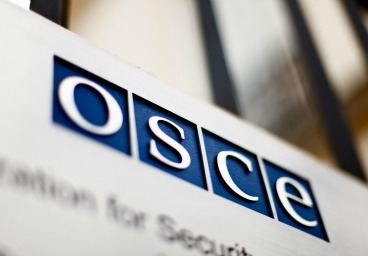On behalf of the United States delegation, I would like to thank our Romanian hosts and you, the ministers, ambassadors, NGOs and my fellow delegates for engaging in a discussion of how to combat anti-Semitism and other forms of intolerance in the OSCE. Let me also commend the Romanian Foreign Minister, Mr. Adrian Cioroianu for proposing to host a regional anti-Semitism meeting. That is a magnificent gesture from Romania.
On a more personal note, it is deeply gratifying for me, as a Congressman for 27 years who has focused on defending human rights, to see the representatives of so many OSCE States gathered here to reaffirm their commitment to combating intolerance.
I was, to steal a phrase from former American Secretary of State Dean Acheson, “present at the creation” of this series of conferences. I remember when, at a hearing I chaired in 2002, in response to what appeared to be a sudden, frightening spike in anti-Semitism in some OSCE countries, including my own, we first proposed the idea for an OSCE conference on combating anti-Semitism. Dr. Samuels of the Wiesenthal Center in Paris testified at that hearing and said, “The Holocaust for 30 years after the war acted as a protective Teflon against blatant ant-Semitic expression. That Teflon has eroded, and what was considered distasteful and politically incorrect is becoming simply an opinion. But,” he quickly warned, “cocktail chatter at fine English dinners can end as Molotov cocktails against synagogues.”
Convinced we had an escalating crisis on our hands, the U.S. teamed with several OSCE partners—especially Gert Weisskirchen from Germany—to push for action and reform.
Those efforts led to Vienna, Berlin, Cordoba, and to Bucharest today.
From the start, before any conference had even taken place, there were colleagues who thought the struggle against anti-Semitism should be folded into a more general effort against intolerance. Well-meaning as that might seem, it would have diluted our focus and resolve. Let’s be frank. Anti-semitism is a particularly insidious form of hate that has had horrific consequences, including genocide. In the span of human history, the Holocaust was yesterday.
So I believe we did the wiser thing. We launched a new struggle against anti-Semitism, and a concurrent battle against other specific forms of intolerance such as discrimination against Muslims, Christians, members of other religions, and against racism, xenophobia, and other related forms of discrimination. We have moved ahead on all these issues.
Those of us who helped birth the Vienna and Berlin conferences certainly never meant to restrict the OSCE’s field of concern. But we did believe that the OSCE should put and sustain a special emphasis on anti-Semitism. We believed that anti-Semitism is a unique evil, a distinct form of intolerance, the oldest form of religious bigotry, and a malignant disease of the heart that has very often led to murder.
Next a brief word on implementation.
In each of the conferences OSCE Participating States have made solemn, tangible commitments to put our words into action.
Although in some countries progress has been made, anti-Semitic acts have not abated in others, and in some nations has actually gotten worse.
So the United States welcomes the OSCE commitment to focus on individual problems and tailor responses to their specificity. This approach is reflected in the mandates of the three personal representatives and we call on more states to support and cooperate with their efforts to put increased muscle behind combating these problems.
We welcome and encourage the continuation of ODIHR programs to develop curricula on teaching about the Holocaust, assisting States to enact hate crime legislation, to train prosecutors and police, especially peer-to-peer like the law enforcement officers program.
And we should convene follow-up expert meetings and another implementation meeting in 2009. We can’t allow human rights fatigue and indifference to set in.
Finally, each of us knows we can and must do better. For our part, let me assure you that the members of the U.S. delegation will return home with fresh enthusiasm, commitment and resolve to eradicate the scourge of hate.
We return home to insist that the purveyors of criminal acts of hate be vigorously pursued and prosecuted. Prosecutorial discretion is a wonderful concept in the administration of justice but our society is ill served when law enforcement looks the other way at anti-Semitic hate crimes.
And we return with an urgent mission to expand Holocaust education and remembrance so that the words, “never again” finally have meaning, and to educate both young and old alike that human rights and tolerance are not fanciful words, but the only way a civilized, compassionate, and caring society can survive and prosper.








